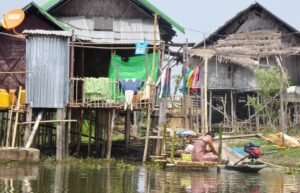There are over 3,000 temples in Bagan…
 |
|
Aureum Palace Hotel in Bagan claimed that 99% of clients
want their sheets changed daily
|
“99% of people like to have their bed linen changed at hotels at least once a day”. Really? I wondered how this assertion could be validated. But, I haven’t been able to respond because it was written by the manager at the Aureum Palace Hotel, Bagan, in Myanmar, on Trip Advisor. My review of the hotel bemoaned the fact that I hadn’t seen the little notice that I needed to put on my bed, to say that I didn’t need the sheets changed during our 2 night stay.
One of the hotels we stayed at – the Rupar Mandalay in Mandalay, there were no notices about either towels or bed linen. Even worse is that all the sun beds around the pool have not one but two towels for guests to use and discard after a single use. I’ve held onto mine (only one, of course!).
 |
| Arriving at the Princess Inle Hotel, where they actively promote their eco policies |
 |
|
Savoy Hotel in Yangon gave us re-usable metal straws
|
Our first night in Myanmar was in the Savoy Hotel, Yangon. I was both surprised and impressed with their metal straw policy – they simply washed the straws like other cutlery. Most of the other hotels have plastic straws in abundance and we’ve managed to refuse them with varying levels of success. Best is when we’ve told the management at the beginning of our stay that we don’t want any, and they have been effective at passing the message onto staff. This hasn’t always worked though.
- Towels: Explain to tourists that towels will only be changed if left on the floor. Make it easy for them to use the minimum number of towels – including for swimming. (Please don’t leave 2 on each sun bed)
- Bed linen: This should only be changed after at least 3 nights occupation, unless a guest requests it. Leave a notices to explain this – but the default position should be no change of linen.
- Straws, stirrers etc: Bring in re-usable metal straws as the main option. If you’re determined to stick with disposable straws use paper ones and get guests to ask for one, if they want one. Introduce re-usable stirrers.
- Napkins: As with straws, get people to ask for a paper napkin if they want one – you could put a box on the table so guests can take a napkin if needed. Linen napkins should also be optional – not all guests want a fresh one with each meal. I dislike waiters trying to lay one out on my knee, when I sit down to eat. And, don’t forget the extra energy and water for laundering.
- Butter: Serve butter in small china bowls, which are filled from a big pack. You simply smooth the butter across the top and can re-use what has not been consumed afterwards. This avoids all those wasteful little plastic packs.
- Bottled water: If you don’t have one already, bring in facilities for refillable glass water bottles – not just for bathrooms, but for restaurants too. Have chilled ones in the mini-bar, and bring them for customers at meal times. You could even have re-fillable, hotel water bottles in metal or plastic for guests to take with them on expeditions – and sell them in the shop.
- Recycling: Team up with other hotels and restaurants in the area to bring in recycling facilities for all. This should include paper, metal, glass and plastics.
- Waste collection: We were horrified at the lack of waste infrastructure in Myanmar. Most of the villages didn’t appear to have any waste collection, which meant that there’s a huge amount of rubbish just dumped out in the open – ultimately, much of it will end up in the sea. The tourism industry need to recognise that this is a problem that they should be doing something about. (Note what’s happened in the Philippines – they’re having to close a resort for 6 months )
- Food waste: Think carefully about how much food you are cooking relative to the number of guests. In pretty well all the hotels we stayed in there was massive over-catering. The food waste must be horrendous. On a few occasions we asked if the excess food was eaten by staff, or given away locally. Although we were told it was, I’m not convinced that’s true, or very common. And, on our cruise up the Irrawaddy, they said that waste food was thrown in the river ‘to feed the fish’ – they were keen to reassure me that no plastics went with it.
- Sewage treatment: I don’t think that any of the hotels we stayed in had untreated sewage going into the river or the sea. Thank heavens for that. However, many of them were very close to areas where this was happening.. Please recognise that this is not just someone else’s problem – get involved in improving the system.
 |
| The WC is on the left with sewage going into the lake – and a lady washing her hair close by – Lake Inle |
- Air conditioning: I hate it. I’m probably a bit of an exception in that I turn it off, immediately I get to my room. But, even for those that like it, there are big improvements to be made. It’s far too cold. The reception area of the Rupar Mandalar Hotel in Mandalay is like a fridge – it’s uncomfortable walking in there. Temperatures should be no lower than 24C and, guests should be encouraged not to have it on all the time, particularly when they’re not in the room. This is not simply an energy issue – although that’s important, air conditioning also uses cooling gases that are a big contributor to climate change.
- Paper: Most hotels print out their bills and put them in envelopes before passing them to guests. I managed to refuse all envelopes, but at the end of my trip, I’ve ended up with a large wad over A4 paper, along with tickets and smaller receipts. At my final stop I asked the hotel to email me my receipt – and they agreed. This option should be offered to all guests, and no-one should be offered an envelope.


